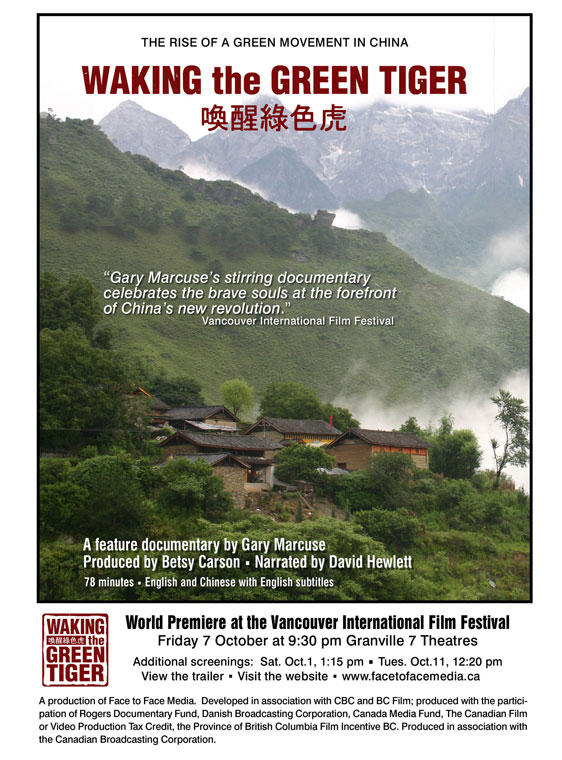Recording Green Tiger's first roars
 0 Comment(s)
0 Comment(s) Print
Print E-mail shanghaidaily.com, July 4, 2012
E-mail shanghaidaily.com, July 4, 2012

The optimistic view of China's environmental movement expressed in "Waking the Green Tiger" surprised even the director of the documentary.
Canadian Gary Marcuse worked with China's prominent environmental activist and filmmaker Shi Lihong for four years to create a film that has won the Grantham Prize Award of Merit for Environmental Journalism and the 2011 Best Canadian Feature Film Award.
With the format of a documentary about a documentary, Marcuse filmed farmers, local activists, journalists and Shi as she took her film "Voice of the Nu River" around communities, and how this title raised awareness.
The story began with the 2004 debate on the proposed construction of a dam on the Nu River in Yunnan, one of the most greatest rivers in China. The area covered would have included the famous Tiger Leaping Gorge.
In an unprecedented outcome, protests by journalists and local activists, among others, brought about new legislation, the Environmental Impact Assessment Law, giving citizens a right to voice objections.
Premier Wen Jiabao also gave instructions that city officials should be cautious when embarking on the project, a big win for the environmentalists.
In the end, the project was put on hold, though there are still calls for the dam to be built.
Comparisons are made with 50 years ago, when the government line was that "man was supposed to conquer nature." Such actions brought about famine in the end, leading to voices in China today calling for the protection, rather than destruction, of nature.
In the film, Shi and journalist-activist Xiao Liangzhao, who tragically died of exhaustion during filming, attempt to convince villagers living along the Nu River that a dam would cause massive environmental harm.
They illustrate this with the example of the disastrous effects of the Mekong River's Manwan dam on villagers who depended on the river and its surrounding farmland for a living.
Villagers from the now relocated Tianba Village paint a heart-wrenching picture - elderly women sifting through garbage recall how they once had land, whereas now "we have nothing."
As well as farmers and prominent figures such as journalists Ma Jun and Liu Jianqing and Chairman of the Committee of Environmental and Nature Resource Conservation Qu Geping, the documentary also features China Central Television coverage of the unfolding story.
However, "Waking the Green Tiger" lacks balance, as supporters of the dam are not featured.
In the end, this is a tribute to efforts to those who sought to protect the homelands of little-known groups, and whose efforts led to a shift in public opinion the film describes as "the beginning of an environmental movement that can transform China."
Interview with the director
"Waking the Green Tiger" is named after the "tiger energy" released by the spirit of the environmental movement in China, explains Canadian director Gary Marcuse.
The filmmaker was confident that beautiful Yunnan Province in southwest China would provide a subject when he first went there in 2004, and was rewarded over the next four years with a surprisingly optimistic story about China's green movement.
"I went into shooting without a story in mind, but halfway through, the story came to me, its results surprising everyone - even myself.
"Many people have told me they had not heard this story, and as a director, my job is to take lesser-known stories, and make them understandable to all audiences."
Marcuse went into filmmaking as he was unsatisfied with what he could achieve in his previous career in radio journalism. "It was easy to report on a problem, but difficult to find a solution. I had watched a lot of good documentaries that created magic, and with my background in fine art and environmental studies, I took my personal passion and went into filmmaking."






Go to Forum >>0 Comment(s)